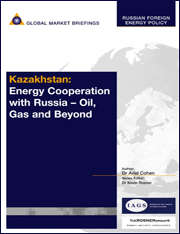Heads up
Dragon at Detroitís gate
The Chinese debut at the Detroit Auto Show with Geely, a mid-sized sedan planned for sale to budget-conscious American families for less than $10,000 by 2008, should be viewed as the opening shot in what is likely to be a clash of titans between the American and Chinese auto industries, one that could send Detroit to the ropes. IAGS Co-director Gal Luft analyzes the implications.
The Eastern Front
Wrestling the Russian Bear
Russia's curtailing deliveries of natural gas to Ukraine goes far beyond the bounds of a common commercial dispute between an energy supplying and an energy consuming nation. It is indicative of Russia's foreign policy vis-ŗ-vis the Soviet Union's former allies spread across Central and Eastern Europe not to mention a warning shot across the bow of Central Asian energy exporters.
The international community appears dumbstruck by Russia's recent flurry of activity as if the issue of energy security remains a back-burner issue traditionally relegated to individual states and entirely disconnected from national security concerns. The fact is that energy security is not only a pressing issue for each and every sovereign nation, but because of the interdependencies that transborder energy transit generate energy security is a regional if not global defense-security concern. The United States knows this only too well, but NATO has yet to respond to this challenge.
IAGS Senior Fellow Dr. Kevin Rosner outlines necessary steps to neutralizing Russia's energy weapon.
Sino-Japanese competition for Russia's far east oil pipeline project
There are two significant energy trends underlying the competition between China and Japan for Russia's Far East oil pipeline project: the need to seek additional energy supplies and to pursue greater energy diversification. And for both China and Japan, Russian energy offers a significant additional supply source and contributes to greater diversification. But these trends in energy interests are matched by an equally dynamic and intense geopolitical rivalry, defined by a complex and contradictory set of converging and diverging national interests.
Within this context, the competition between China and Japan, as well as the Russian role in exploiting this rivalry, is driven by the distinct energy interests of each country. IAGS Associate Fellow Richard Giragosian analyzes.
Sino-Japanese oil rivalry spills into Africa
China and Japan - the two giants of East Asia - are competing for energy
resources around the globe. Their rivalry in the East China Sea, Russia,
Central Asia and Southeast Asia has been well documented. Yet little has
been written in Washington about the impact of Sino-Japanese rivalry in
Africa.
With one-third of its top 15 oil suppliers in Africa, the United States
ignores the challenges of this geopolitical dynamic at its peril. Joshua Eisenman and Devin T Stewart discuss.
|
New IAGS books


China deals a blow to India's aspirations in Kazakhstan
The "unconditional" final ruling of October 26 2005 by the Alberta Court of Queen's Bench, Canada, in favour of China's China National Petroleum Corporation (CNPC) dealt a severe blow to the last Indian hope of acquiring PetroKazakhstan. The defeat in securing an important energy deal does not bode well for India's energy security concerns considering its growing energy needs and illustrates India's vulnerability in competing and securing depleting international energy sources. At the same time it opens up for greater debate the Indian energy minister's fervent argument that Asia's two emerging economic giants should co-operate rather than compete in securing international energy deals.
Reality Check
Oil puts Iran out of reach
As diplomatic rumbles regarding sanctions against Iran fill the airwaves, IAGS' Gal Luft notes that given Iran's key position as an oil supplier and the tightness of the oil market, Iran's influence on the world's economy makes it virtually untouchable.
No doubt, Iran is heavily dependent on petrodollars and denying it oil revenues would no doubt hurt its economy and might even spark social discontent. Oil revenues constitute over 80 percent of its total export earnings and 50 percent of its gross domestic product.
But the Iranians know that oil is their insurance policy and that the best way to forestall U.S. efforts in the United Nations is by getting into bed with energy hungry powers such as Japan and the two fastest growing energy consumers, China and India.
Threatening Iran with sanctions may well force it to flex its muscles by cutting its oil production and driving oil prices to new highs in order to remind the world how harmful such a policy could be.
|
 Energy Security
Prepared by the Institute for the Analysis of Global Security
Energy Security
Prepared by the Institute for the Analysis of Global Security


